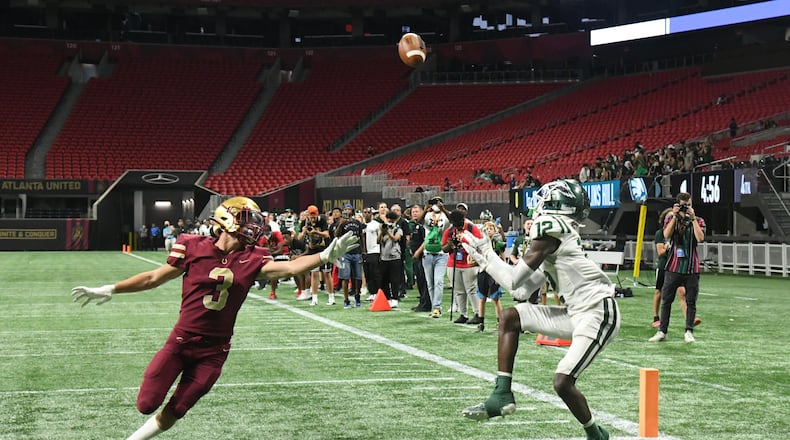With the NCAA clearing the way for name, image and likeness deals this season, the college level has replaced the NFL as the first chance for athletes to make money. The impact of NIL deals already can be felt at the high school level.
Quinn Ewers, originally a top-rated quarterback for the Class of 2022, reclassified to 2021 and graduated early after the NIL ruling passed, foregoing his senior football season to attend Ohio State. On Tuesday, his motivations for reclassifying were confirmed when it was announced he had signed a $1.4 million NIL deal.
The NFHS has taken a proactive stance on NIL, releasing a statement in February outlining its concerns of how NIL could endanger amateurism at the high school level, and then in July — days after the NIL ruling — it issued another statement reminding members that athletes cannot earn money because of their connection to their high school teams.
GHSA bylaws state that athletes forfeit their amateur status if they accept compensation or sign a deal based on their athletic prowess, with exceptions such as reasonable allowances for travel, meals and lodging. Athletes also are allowed as much as $400 a year for awards like state-title rings.
With blue-chip high school seniors months away from a college opportunity, they could be approached to negotiate NIL deals while still in high school. That possibility isn’t lost on GHSA executive director Robin Hines, who said the bylaws have that covered.
“If colleges are allowed to offer kids in middle school, then why do we expect (NIL negotiations) to start later? Just as an analogy,” Hines said. “It could get problematic, but our rules remain in place.”
Travis Hunter is a senior 5-star athlete for Collins Hill and the No. 2 overall player in the country, according to the 247Sports Composite. There was a paparazzi-type following at the Eagles’ game in the Corky Kell Classic at Mercedes-Benz Stadium, and the attention was centered around Hunter, who committed to Florida State.
“I’ve never seen more cameras on a person or companies on Instagram promoting someone the way they are with Hunter,” 247Sports recruiting analyst Rusty Mansell said. “Everybody wanted a piece of him. People I’ve never seen before, and they were just all over him, trying to interview him during the game on the sideline. I’ll be interested to see how Collins Hill handles that the rest of the year because it’s my gut feeling they tighten down that circle around him.”
Collins Hill coach Lenny Gregory declined an interview.
Mansell said any potential NIL trickle-down effect likely will be market-driven and keyed toward a few select elite recruits such as Hunter.
“He’s a guy who can’t do anything (without losing his eligibility) now with NIL,” said Mansell, “but when he gets to FSU, he’ll get some very big opportunities thrown at him really quickly.”
Reclassifying to graduate early like Ewers did or foregoing a senior year of football season to preserve health and/or NIL potential could be an annual occurrence when it comes to elite recruits. Mansell wondered if Trevor Lawrence would have played his senior season had NIL rules existed when he graduated following the 2017 season.
Lawrence’s junior year was the second of consecutive 15-0 Class 4A state championship seasons at Cartersville, and Mansell said Lawrence was far enough along academically that he could have graduated a year early.
“You wonder about things like that and if it will speed kids through school, but right now in the state of Georgia, I think that will be very limited,” Mansell said.
At Pace Academy, coach Chris Slade has sent several recruits to college and the NFL since taking over in 2013. He’s concerned the motivation for some may switch from winning team championships to self-preservation.
“Maybe a senior decides, ‘I’m just going to coast because I’ll be a freshman in college next year and I’ve got $100,000 waiting for me in about 6-7 months, so I’m not going to play my senior year, or I’m going to take it easy so I won’t get hurt.’ The challenge for me becomes, how do I keep them motivated? What’s going to inspire them?”
Buford coach Bryant Appling, who guided the Wolves to the past two 6A titles, said he’ll advise his players about NIL on an individual basis.
“It’s just like kids skipping out on bowl games in college,” Appling said. “That’s what the trickle-down is starting to become. ... I hate to say it, but it might make sense for a kid who knows he’s going to sign for all that money to not risk his career. There have been a couple of times throughout my career that I had to put myself in another family’s situation, and if that’s what makes sense for that family and their situation, there’s nothing you can do to argue against it.”
About the Author
The Latest
Featured

